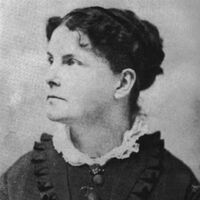The Wreck of the Pocahontas
I LIT the lamps in the lighthouse tower,
For the sun dropped down and the day was dead.
They shone like a glorious clustered flower, —
Ten golden and five red.
Looking across, where the line of coast
Stretched darkly, shrinking away from the sea,
The lights sprang out at its edge, —almost
They seemed to answer me!
O warning lights! burn bright and clear,
Hither the storm comes! Leagues away
It moans and thunders low and drear, —
Burn till the break of day!
Good-night! I called to the gulls that sailed
Slow past me through the evening sky;
And my comrades, answering shrilly, hailed
Me back with boding cry.
A mournful breeze began to blow;
Weird music it drew through the iron bars;
The sullen billows boiled below,
And dimly peered the stars;
The sails that flecked the ocean floor
From east to west leaned low and fled;
They knew what came in the distant roar
That filled the air with dread!
Flung by a fitful gust, there beat
Against the window a dash of rain:
Steady as tramp of marching feet
Strode on the hurricane.
It smote the waves for a moment still,
Level and deadly white for fear;
The bare rock shuddered, —an awful thrill
Shook even my tower of cheer.
Like all the demons loosed at last,
Whistling and shrieking, wild and wide,
The mad wind raged, while strong and fast
Rolled in the rising tide.
And soon in ponderous showers, the spray,
Struck from the granite, reared and sprung
And clutched at tower and cottage gray,
Where overwhelmed they clung
Half drowning to the naked rock;
But still burned on the faithful light,
Nor faltered at the tempest’s shock,
Through all the fearful night.
Was it in vain? That knew not we.
We seemed, in that confusion vast
Of rushing wind and roaring sea,
One point whereon was cast
The whole Atlantic’s weight of brine.
Heaven help the ship should drift our way!
No matter how the light might shine
Far on into the day.
When morning dawned, above the din
Of gale and breaker boomed a gun!
Another! We who sat within
Answered with cries each one.
Into each other’s eyes with fear
We looked through helpless tears, as still,
One after one, near and more near,
The signals pealed, until
The thick storm seemed to break apart
To show us, staggering to her grave,
The fated brig. We had no heart
To look, for naught could save.
One glimpse of black hull heaving slow,
Then closed the mists o’er canvas torn
And tangled ropes swept to and fro
From masts that racked forlorn.
Weeks after, yet ringed round with spray
Our island lay, and none might land;
Though blue the waters of the bay
Stretched calm on either hand.
And when at last from the distant shore
A little boat stole out, to reach
Our loneliness, and bring once more
Fresh human thought and speech,
We told our tale, and the boatmen cried:
“'T was the Pocahontas, —all were lost!
For miles along the coast the tide
Her shattered timbers tossed.”
Then I looked the whole horizon round, —
So beautiful the ocean spread
About us, o’er those sailors drowned!
“Father in heaven,” I said, —
A child’s grief struggling in my breast, —
“Do purposeless thy children meet
Such bitter death? How was it best
These hearts should cease to beat?
”Oh wherefore? Are we naught to Thee?
Like senseless weeds that rise and fall
Upon thine awful sea, are we
No more then, after all?"
And I shut the beauty from my sight,
For I thought of the dead that lay below;
From the bright air faded the warmth and light,
There came a chill like snow.
Then I heard the far-off rote resound,
Where the breakers slow and slumberous rolled,
And a subtile sense of Thought profound
Touched me with power untold.
And like a voice eternal spake
That wondrous rhythm, and, “Peace, be still!”
It murmured, “bow thy head and take
Life’s rapture and life’s ill,
”And wait. At last all shall be clear."
The long, low, mellow music rose
And fell, and soothed my dreaming ear
With infinite repose.
Sighing I climbed the lighthouse stair,
Half forgetting my grief and pain;
And while the day died, sweet and fair,
I lit the lamps again.
A THANKSGIVING
HIGH on the ledge the wind blows the bayberry bright,
Turning the leaves till they shudder and shine in the light;
Yellow St. John’s-wort and yarrow are nodding their heads,
Iris and wild-rose are glowing in purples and reds.
Swift flies the schooner careering beyond o’er the blue;
Faint shows the furrow she leaves as she cleaves lightly through;
Gay gleams the fluttering flag at her delicate mast;
Full swell the sails with the wind that is following fast.
Quail and sandpiper and swallow and sparrow are here:
Sweet sound their manifold notes, high and low, far and near;
Chorus of musical waters, the rush of the breeze,
Steady and strong from the south, —what glad voices are these!
O cup of the wild-rose, curved close to hold odorous dew,
What thought do you hide in your heart? I would that I knew!
O beautiful Iris, unfurling your purple and gold,
What victory fling you abroad in the flags you unfold?
Sweet may your thought be, red rose, but still sweeter is mine,
Close in my heart hidden, clear as your dewdrop divine.
Flutter your gonfalons, Iris, the pæan I sing
Is for victory better than joy or than beauty can bring.
Into thy calm eyes, O Nature, I look and rejoice;
Prayerful, I add my one note to the Infinite voice:
As shining and singing and sparkling glides on the glad day,
And eastward the swift-rolling planet wheels into the gray.

